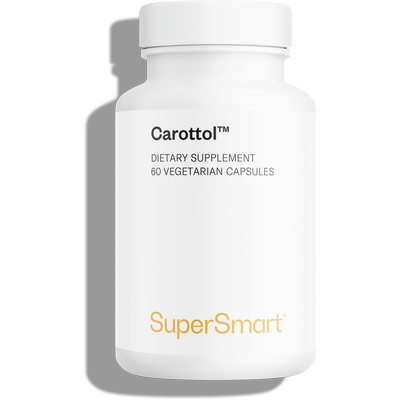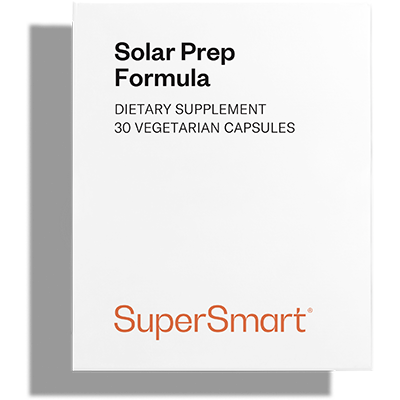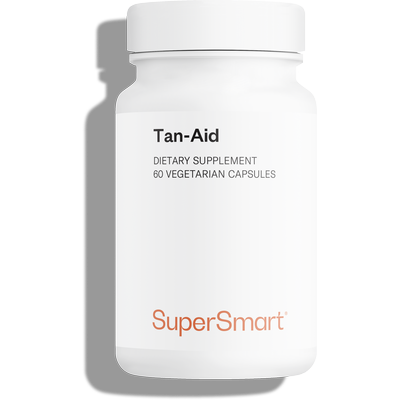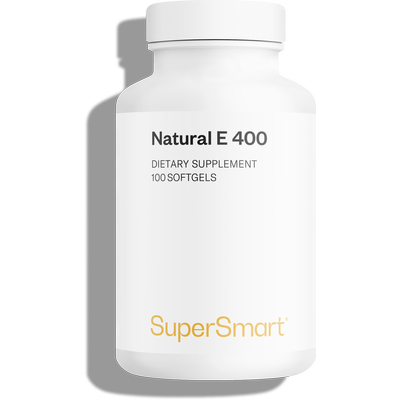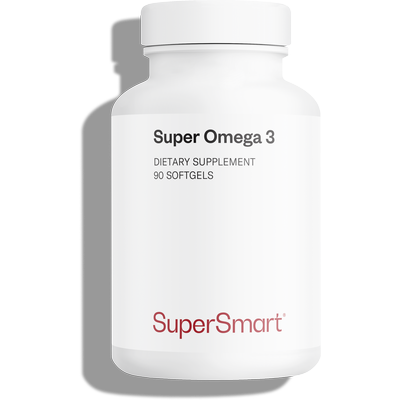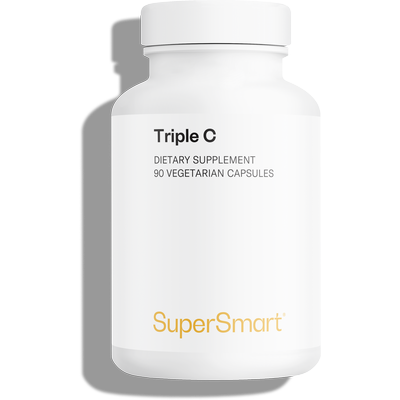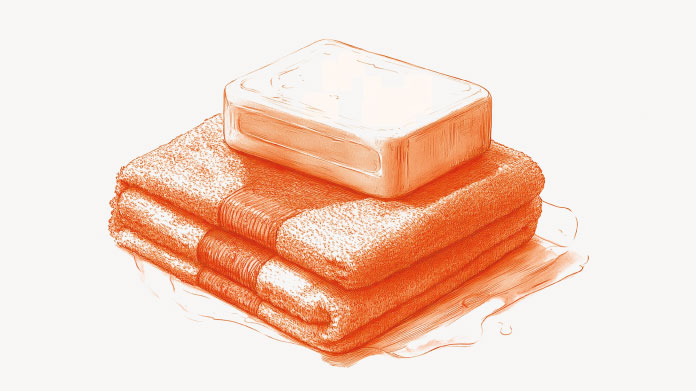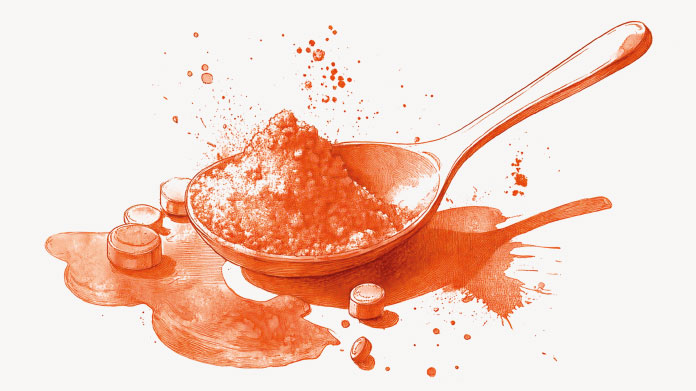
Definition of a tan
A tan is a natural, protective reaction by the skin to ultraviolet (UV) rays emitted by the sun, sunlamps and tanning beds.
When the skin is exposed to these rays, it produces more melanin, a pigment that darkens the colour of the skin.
Melanin provides partial protection from UV and reduces damage such as burning. But it has limited efficacy and cannot prevent all the harmful effects of sun exposure (including sunburn and increased risk of skin cancer), hence the importance of sun protection.
Let’s take a look at the vitamins that can help prepare the skin for exposure to the sun and help produce a safer, more effective tan.
Vitamins to consider when it comes to tanning
A vitamin A precursor for protecting and giving colour to the skin
Carotenoids are natural pigments that include lycopene, astaxanthin, zeaxanthin, lutein and beta-carotene. The latter is a precursor of vitamin A, which helps maintain normal skin and mucous membranes.
It’s no myth that most carotenoids, especially beta-carotene, help give the skin a more golden hue (1) and are thought to slightly increase protection against UV rays. They are often incorporated into cosmetics to prevent UV-induced photoageing of the skin (2).
According to some studies, consuming carotenoids may increase the minimal erythema dose (MED) (the minimum dose required to trigger just perceptible erythema in the skin 24 hours after a single UV-exposure). The higher the MED, the greater the UV protection.
Carotenoids are found in brightly-coloured fruits and vegetables such as bell peppers, broccoli, carrots, apricots, melon, berries, tomatoes, etc, and at higher levels in specific supplements (such as Carottol™).
Be aware, however, that carotenoids only provide limited protection, so it is still important to use sunscreens and/or wear protective clothing. What’s more, carotenoid supplementation is not recommended for everyone: studies show it may be associated with an increased risk of skin cancer in certain groups, particularly smokers. Be sure to seek advice from your doctor.
Vitamin C, an antioxidant and key nutrient for skin collagen
An antioxidant, vitamin C helps protect skin cells against oxidative stress caused by sun exposure (3).
It also plays a role in the normal formation of collagen (the most abundant protein in the skin), helping the skin to stay supple and healthy despite the sun’s efforts otherwise.
Good dietary sources of vitamin C include citrus fruit, peppers, kiwi fruit and parsley, as well as dietary supplements (such as Triple C). But here too, increased vitamin C intake does not preclude the need for continued use of sunscreens.
Vitamin E to fight inflammatory oxidative stress
Vitamin E is another powerful antioxidant of interest when it comes to safer tanning.
When exposed to the sun, the body’s levels of vitamin E can become quickly depleted, as it fights to protect against attack from UV rays. It is also thought to reduce inflammation of the skin caused by the sun (4).
So to achieve a healthy suntan, it makes sense to eat vitamin E-rich foods or take a vitamin E supplement, preferably one containing α-tocopherol (the most active form, such as that in Natural E 400). Once again, it is important to keep using a sunscreen.
It’s worth noting the skin creams and cosmetics are often enriched with vitamin E precisely for its antioxidant properties.
Additional tips for getting the skin sun-ready and helping it ‘tan better’
Reminder of some health risks
The best kind of tan is one that avoids problems like sunburn and allergic reactions, and reduces the long-term risk of cancer and premature ageing of the skin. Here are some tips to help you in this regard.
Avoid tanning booths
Many people are under the impression that a pre-holiday session in a tanning booth will help prepare their skin and protect it from the sun’s rays. The truth is that any tan produced by these booths is short-lived, as the machines do not emit enough UVB rays to produce new melanin. As a result, they provide no protection against future exposure to natural UV.
Consider taking melanin supplements
After the age of 30, the body’s melanocyte numbers decline by 10%-20% each decade, making it more difficult to tan as we get older. One possible solution is to take a keratin hydrolysate supplement standardised in melanin (such as Tan-Aid).
Potential benefits of omega-3 for safe tanning
While again, they are not a substitute for sunscreens, omega-3 fatty acids may also contribute to the skin’s own natural protection.
These fatty acids actually become integrated into the membranes of skin cells and may thus play a modest role in helping them resist UV aggression.
Omega-3 are found in oily fish, nuts and fish oils (such as Super Omega 3).
Be sensible when it comes to sun exposure
- Apply sunscreen every hour, even when your skin is tanned and feels as if it’s protected from the sun: tanning only provides a minimal sun protection factor (SPF), rarely more than 5, rather than the SPF of 30 recommended.
- Avoid the sun between 11am and 4pm.
- Moisturise your skin, as much to strengthen the skin barrier, under stress from UV rays, as to prevent unsightly dryness.
- Opt for comprehensive tanning capsules (such as those from Solar Prep Formula) to prepare your skin, help protect it from UV rays, facilitate your tan, and extend its duration.
Tanning: the two types of UV to be aware of
UV-B, responsible for a delayed but longer-lasting tan
There are two types of UV rays that impact the skin, each with a different effect.
UV-B rays are easily blocked by the epidermis, the outermost layer of the skin. It’s UVB rays that cause sunburn and are the most dangerous in the short term, with the potential to trigger superficial forms of skin cancer (such as carcinomas).
When confronted with UVB, melanocytes react by producing melanin granules, melanin being the pigment responsible for absorbing future rays and thus providing the skin with better protection against subsequent exposure.
These melanocyte skin cells enclose the granules in vesicles called melanosomes: the larger and more numerous they are, the darker the skin becomes, and the better the skin’s ‘self-protection’.
Meanwhile, cells in the skin’s superficial layer called keratinocytes multiply to make it stronger and less permeable to UV rays.
It’s this dual process that results in firm golden skin. This kind of tanning occurs 48-72 hours after exposure and can last several weeks.
UV-A rays produce a fast but short-lived glow
UV-A rays meanwhile are less ‘energetic’ but penetrate deeper into the skin.
They cause long-term damage to skin cells and constituents, gradually accelerating skin ageing and having the potential to cause skin cancer (such as melanoma).
These rays also trigger a protective response by ‘activating’ existing melanin, helping to intensify your tan.
This type of tan appears just a few minutes after sun exposure but disappears very quickly. This is the tan characteristic of beauty salons.
SUPERSMARTADVICE
References
- Lascari AD. Carotenemia. A review. Clin Pediatr (Phila). 1981 Jan;20(1):25-9. doi:0.1177/000992288102000103. PMID: 7449242.
- CHEN L, HU JY, WANG SQ. The role of antioxidants in photoprotection: a critical review. J Am Acad Dermatol. nov 2012;67(5):1013 24
- Padayatty SJ, Katz A, Wang Y, Eck P, Kwon O, Lee JH, Chen S, Corpe C, Dutta A, Dutta SK, Levine M. Vitamin C as an antioxidant: evaluation of its role in disease prevention. J Am Coll Nutr. 2003 Feb;22(1):18-35. doi: 10.1080/07315724.2003.10719272. PMID: 12569111.
- Rizvi S, Raza ST, Ahmed F, Ahmad A, Abbas S, Mahdi F. The role of vitamin e in human health and some diseases. Sultan Qaboos Univ Med J. 2014 May;14(2):e157-65. Epub 2014 Apr 7. PMID: 24790736; PMCID: PMC3997530.
14 Days
Reliable delivery
Reliable delivery. Good product.
Viva
28 Days
Great service
Great service
cl
30 Days
Received product promptly and its early…
Received product promptly and its early days but seems to have improved my daughters alertness.
Anandi
40 Days
Amazing
Amazing, great product!
ALEX Sinclair
43 Days
Good products and Swift handling
Good products and Swift handling
Trusted
48 Days
I trust the company's product
I trust the company's products, the quality is trustworthy and the speed of delivery is also appreciated.
NAJIB Malaah
48 Days
Good job.
This company is serious when it comes to serving it's customers. They are fast to send out the orders. Their site is great and easy. Also, they treat their return customers with great deals and discounts. Keep up the good work.
ABDULQADER Jehad
50 Days
I know frech ( level 3 of 6) and can…
I know frech ( level 3 of 6) and can read your messages, but since order are official documents I'd like to have this in english. Merci Ursula Mathes
Ursula Mathes
53 Days
I worried the delivery.
Box was intact, content correct but delivery time was 12 days. I started to worry!
VIITANEN Esa
56 Days
Supply of Chondroitin 6-sulphate
The company has provided the required product efficiently with no complications.
OldBear
57 Days
Supersmart sell a lot of interesting…
Supersmart sell a lot of interesting stuff. More than jut the usual vitamins though they do all those as well. Ordering pretty straightforward - you may need to try a couple of times to get the offers to apply but they do work. I queried something and had a fairly quick sensible reply. Postage takes a couple if days but you do get good progress information. Very well packed. Bought from Supersmart a few times and will do so again.
AT Griffin
11 Days
Excellent
On m'a mis bien.
cliente
14 Days
qualité des produits et services
qualité des produits et services
denis riegel
15 Days
Nehme das Produkt noch zu kurz um eine…
Nehme das Produkt noch zu kurz um eine Bewertung abgeben zu können
Ermelinde
15 Days
Très satisfait
J'apprécie la facilité de navigation sur le site, le suivi des commandes, et bien sûr, la qualité des compléments alimentaires.
LE COUR SERGE

